US Fiance Visa (K1 Visa)
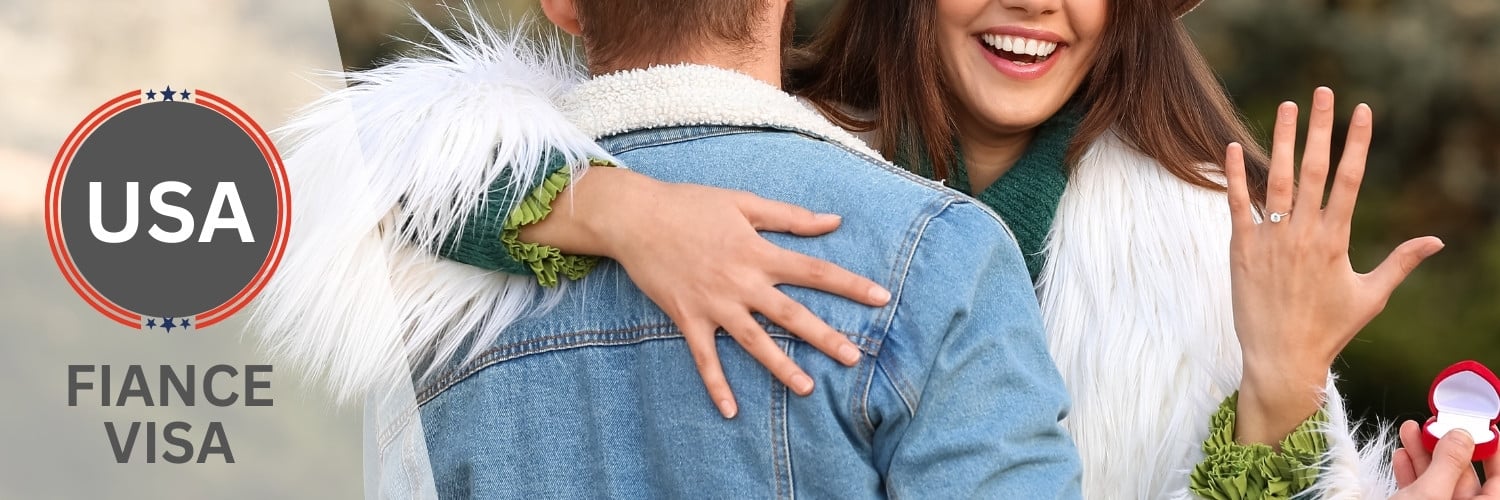
Welcome to Oliveira Lawyers, your trusted partner for immigration services in the US. Our dedicated team specializes in helping individuals around the world navigate the complexities of the US Fiance Visa (K1 Visa) process. If you’re planning to bring your foreign fiancé to the United States, you’ve come to the right place.
Here, you have the most comprehensive guide on the so-called Fiancé Visa, also known as the K-1 Visa, designed for U.S. citizens who wish to bring their foreign fiancé to the United States with the intent of getting married. This visa allows the fiancé to enter the U.S. for 90 days, during which the couple must get married. Following the marriage, the foreign spouse can apply for Adjustment of Status to become a lawful permanent resident (Green Card holder).
Choosing a Fiancé Visa over other types of visas offers several benefits. It provides a clear path to permanent residency, allows for quicker family reunification, and permits work authorization shortly after entering the U.S. Our team is here to simplify the application process, ensuring that all requirements are met and that your journey to marriage and residency is smooth and stress-free.
Fiance Visa in the US?
We can help!
#1 Contact us to get a free quote, or
#2 Schedule a Consultation now.
What is a Fiancé Visa (K-1 Visa)?
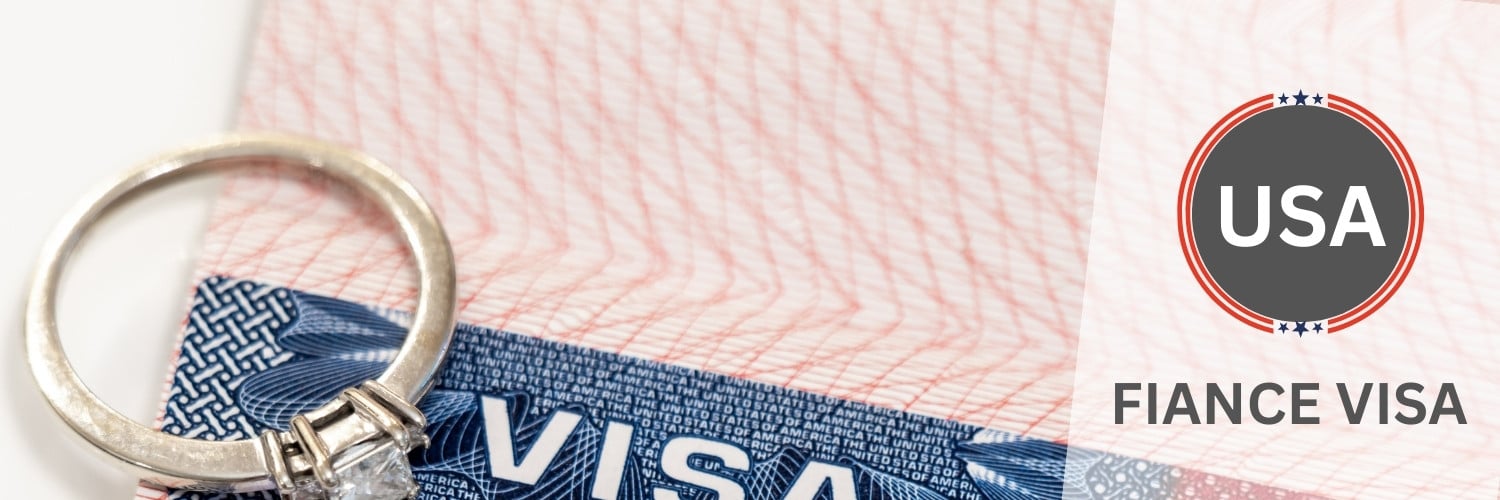
The Fiance Visa, officially known as the K-1 Visa, is a special non-immigrant visa designed for foreign nationals who are engaged to be married to a U.S. citizen. This visa allows the foreign fiancé to enter the United States for a period of 90 days, during which the couple must get married. Following the marriage, the foreign spouse can then apply for Adjustment of Status to become a lawful permanent resident (Green Card holder).
Definition and Purpose of the K-1 Visa
The K-1 Visa is intended to facilitate the entry of foreign fiances into the United States, allowing them to marry their U.S. citizen partners and subsequently apply for permanent residency. This visa is specifically tailored for couples who have a genuine intention to marry and build a life together in the U.S. The primary purpose of the K-1 Visa is to enable the couple to unite in the United States, provided they meet all the necessary legal and procedural requirements.
Eligibility Criteria for the Petitioner and the Beneficiary
To qualify for a Fiancé Visa, both the U.S. citizen petitioner and the foreign national beneficiary must meet certain eligibility requirements:
U.S. Citizen Petitioner: The petitioner must be a U.S. citizen. Lawful permanent residents (Green Card holders) are not eligible to petition for a K1 Visa for their fiancés.
Intent to Marry: Both parties must demonstrate a bona fide intent to marry within 90 days of the fiancé’s arrival in the United States. This intent must be supported by evidence such as engagement photos, wedding plans, and affidavits from friends and family.
Meeting in Person: The couple must have met in person at least once within the two years preceding the filing of the petition. Exceptions may be granted for cultural or religious reasons, but these are rare and require substantial evidence.
Legal Capacity to Marry: Both parties must be legally free to marry, meaning they are not currently married to someone else. Any previous marriages must be legally terminated through divorce, annulment, or death.
Importance of Genuine Relationship Evidence
A critical aspect of the K1 Visa application is proving the genuineness of the relationship. USCIS (U.S. Citizenship and Immigration Services) requires substantial evidence that the relationship is legitimate and not solely for immigration purposes. This evidence can include:
Photographs: Pictures of the couple together during various occasions and trips.
Communication Records: Emails, chat logs, phone records, and letters showing regular communication.
Affidavits: Statements from friends, family, or colleagues affirming the authenticity of the relationship.
Financial Records: Joint financial accounts, remittance receipts, and other financial transactions demonstrating financial interdependence.
Travel Records: Copies of airline tickets, hotel bookings, and other travel documents indicating visits and trips taken together.
By thoroughly documenting the relationship and meeting all eligibility criteria, the chances of a successful K-1 Visa application are significantly improved.
K1 Visa in the US?
We Can Help You
#1 Contact us to get a free quote, or
#2 Schedule a Consultation now.
Benefits of a Fiancé Visa (K-1 Visa)
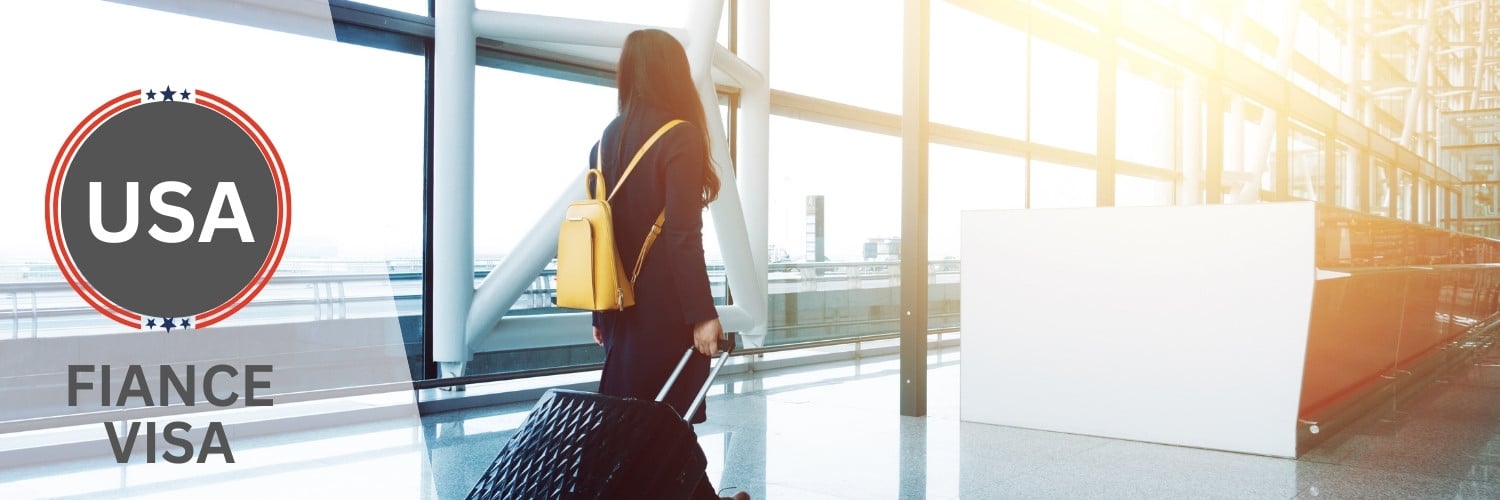
Obtaining a Fiancé Visa (K-1 Visa) offers numerous advantages for couples planning to start their lives together in the United States. This visa is specifically designed to facilitate the process of bringing foreign fiancés to the U.S., ensuring they can marry and eventually apply for permanent residency. Here are the key benefits of the K-1 Visa:
Rights and Privileges of K-1 Visa Holders
It is not surprising that the K-1 is one of the most famous visas given its amazing benefits:
Entry to the United States: The primary benefit of the K-1 Visa is that it allows the foreign fiancé to enter the U.S. legally. This visa grants entry for a period of 90 days, during which the marriage must take place.
Pathway to Permanent Residency: After getting married within the 90-day period, the foreign spouse can apply for Adjustment of Status (Form I-485) to become a lawful permanent resident (Green Card holder). This process involves submitting the necessary forms and supporting documents to USCIS.
Work Authorization: K-1 Visa holders can apply for a work permit (Employment Authorization Document, EAD) by filing Form I-765. This enables the foreign fiancé to work legally in the United States while waiting for their Adjustment of Status application to be processed.
Pathway to Permanent Residency (Green Card) After Marriage
The K-1 Visa provides a straightforward route to obtaining a Green Card:
Marriage within 90 Days: The couple must get married within 90 days of the foreign fiancé’s arrival in the U.S. Failure to marry within this timeframe may result in the foreign fiancé having to leave the country.
Adjustment of Status: Once married, the foreign spouse can file Form I-485 (Application to Register Permanent Residence or Adjust Status). This application includes a comprehensive set of documents to prove the legitimacy of the marriage and the foreign spouse’s eligibility for permanent residency.
Interview and Approval: USCIS may schedule an interview to verify the authenticity of the marriage. Once the application is approved, the foreign spouse will receive a Green Card, granting them lawful permanent residency in the United States.
Work Authorization for K-1 Visa Holders
One significant advantage of the K-1 Visa is the ability to obtain work authorization:
Application for Work Permit: K-1 Visa holders can apply for an Employment Authorization Document (EAD) by filing Form I-765. This application can be submitted either after arriving in the U.S. or concurrently with the Adjustment of Status application.
Work Eligibility: Once the EAD is approved, the foreign fiancé is authorized to work in the U.S. This can be particularly beneficial for couples who need additional income or for the foreign fiancé to continue their career in the United States.
Duration and Renewal: The EAD is typically valid for one year and can be renewed if necessary. Once the Adjustment of Status is approved and the Green Card is received, the foreign spouse will no longer need the EAD to work legally in the U.S.
Fiancé Visa Requirements

Understanding the requirements for a Fiancé Visa (K-1 Visa) is essential for a successful application. Both the U.S. citizen petitioner and the foreign national beneficiary must meet specific criteria and provide substantial documentation to prove their eligibility. This section details the key requirements and necessary documentation to ensure your application process is as smooth as possible.
Detailed List of Requirements for the U.S. Citizen Petitioner
- Must be a U.S. citizen.
- Must have met the foreign fiancé in person at least once within the two years prior to filing the petition (exceptions apply for certain cultural or religious practices).
- Must have the intent to marry the foreign fiancé within 90 days of their arrival in the U.S.
- Must be legally free to marry (e.g., any previous marriages must be legally terminated).
- Must meet certain income requirements to sponsor the fiancé, proving financial stability and the ability to support the fiancé.
Detailed List of Requirements for the Foreign Fiancé Beneficiary:
- Must be legally free to marry.
- Must have the intent to marry the U.S. citizen petitioner within 90 days of arrival in the U.S.
- Must pass a medical examination and meet health requirements.
- Must have no criminal history that would make them inadmissible to the U.S.
- Must provide evidence of a bona fide relationship with the U.S. citizen petitioner.
Necessary Documentation
To support your K-1 Visa application, you will need to provide various documents that prove your eligibility and the authenticity of your relationship. Here’s a comprehensive list:
Form I-129F:
The Petition for Alien Fiancé (Form I-129F) must be completed and signed by the U.S. citizen petitioner.
Proof of Citizenship:
The U.S. citizen petitioner must provide a copy of their birth certificate, passport, or certificate of naturalization as proof of U.S. citizenship.
Photographs:
Passport-style photos of both the U.S. citizen petitioner and the foreign fiancé must be included.
Evidence of In-Person Meeting:
Photos, airline tickets, hotel receipts, and other documents showing that the couple has met in person within the last two years.
Intent to Marry:
Letters from both parties stating their intent to marry within 90 days of the foreign fiancé’s arrival in the U.S.
Proof of Relationship:
Evidence such as photos together, communication logs (emails, chat histories), and affidavits from friends and family confirming the relationship.
Divorce Decrees:
If either party has been previously married, official divorce decrees or death certificates must be provided to prove legal capacity to marry.
Financial Evidence:
The U.S. citizen petitioner must submit an Affidavit of Support (Form I-134) to demonstrate they meet the income requirements to sponsor the fiancé. This can include tax returns, pay stubs, and employment verification.
Medical Examination:
The foreign fiancé must undergo a medical examination by an approved physician and provide the results as part of the visa application process.
Police Certificates:
The foreign fiancé must provide police certificates from their country of residence and any other country where they have lived for more than six months since the age of 16.
Medical Examination and Vaccination Requirements
The foreign fiancé must undergo a medical examination conducted by an authorized panel physician. This examination ensures that the applicant does not have any medical conditions that would make them inadmissible to the United States. The examination includes:
- A review of medical history and immunization records.
- Physical examination.
- Tests for communicable diseases such as tuberculosis.
- Vaccinations required by U.S. immigration law.
Providing all the required documentation and meeting the eligibility criteria are crucial steps in the Fiancé Visa application process. Ensuring that you have accurate and complete documentation will significantly improve your chances of a successful application.
K1 Visa in the US? Perfect If
You Were Not Approved for a Visitor Visa!
#1 Contact us to get a free quote, or
#2 Schedule a Consultation now.
US Fiance Visa Application Process
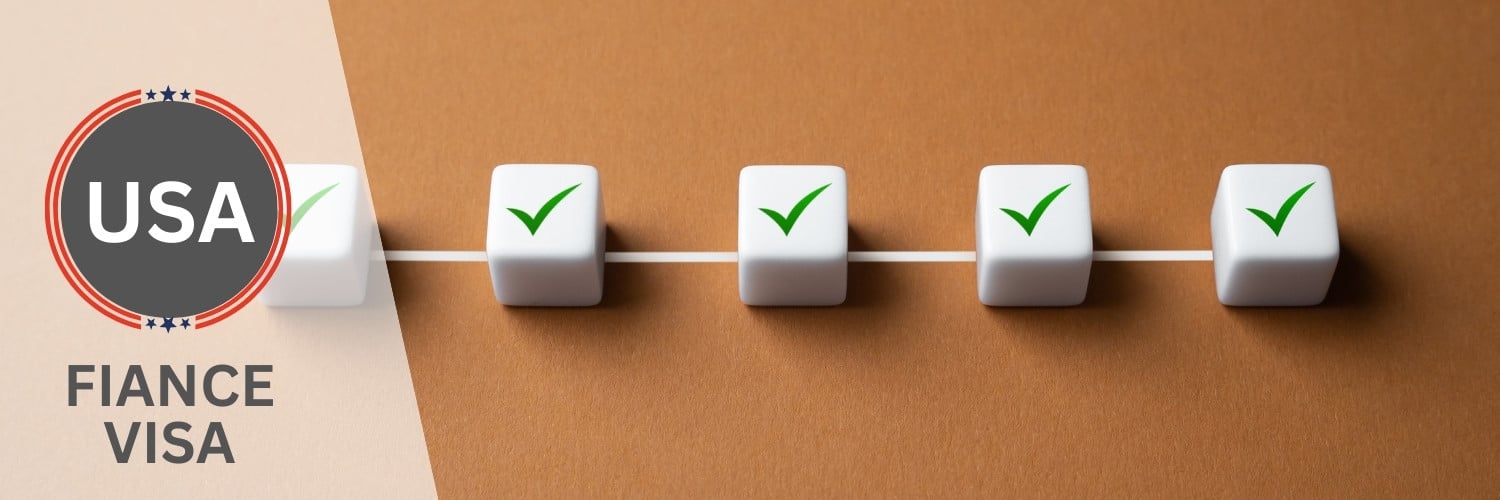
Navigating the Fiancé Visa (K-1 Visa) application process can be complex, but understanding each step can make it more manageable. This section provides a detailed overview of the Fiancé Visa application, ensuring all requirements are met.
Step-by-Step Guide to the K1 Visa Application Process
1. Filing the I-129F Petition:
- Complete Form I-129F: The U.S. citizen petitioner must fill out and sign Form I-129F, Petition for Alien Fiancé. This form establishes the relationship between the U.S. citizen and the foreign fiancé.
- Gather Supporting Documents: Include all necessary supporting documents such as proof of U.S. citizenship, evidence of the relationship, intent to marry, and photos of both parties.
- Submit the Petition: Send the completed petition and supporting documents to the appropriate USCIS (U.S. Citizenship and Immigration Services) address along with the filing fee.
2. Approval from USCIS:
- Notice of Receipt: After submitting the petition, USCIS will send a Notice of Receipt (Form I-797C) to confirm they have received the application.
- Processing Time: USCIS will review the petition, which may take several months. During this time, they may request additional information or evidence.
- Notice of Approval: If the petition is approved, USCIS will send a Notice of Approval (Form I-797) and forward the petition to the National Visa Center (NVC).
3. National Visa Center (NVC) Processing:
- Case Number Assignment: The NVC assigns a case number and forwards the petition to the U.S. Embassy or Consulate where the foreign fiancé will apply for the K-1 Visa.
- Document Submission: The NVC may require additional documents, which should be submitted promptly to avoid delays.
4. Visa Interview at the U.S. Embassy or Consulate:
- Schedule the Interview: The foreign fiancé must schedule a visa interview at the U.S. Embassy or Consulate in their home country.
- Medical Examination: Complete the required medical examination by an authorized physician before the interview.
- Prepare Documents: Bring all required documents to the interview, including the approved I-129F petition, valid passport, police certificates, medical examination results, and evidence of the relationship.
- Attend the Interview: During the interview, a consular officer will review the application and ask questions to verify the authenticity of the relationship. If approved, the K-1 Visa will be issued.
5. Entry to the U.S. and the 90-Day Marriage Requirement:
- Travel to the U.S.: With the K-1 Visa, the foreign fiancé can travel to the United States. They must enter the U.S. within the visa’s validity period.
- Get Married: The couple must get married within 90 days of the foreign fiancé’s arrival in the U.S. Failure to marry within this timeframe may result in the foreign fiancé having to leave the country.
6. Applying for Adjustment of Status (AOS):
- Complete Form I-485: After getting married, the foreign spouse can apply for Adjustment of Status by filing Form I-485 (Application to Register Permanent Residence or Adjust Status).
- Submit Supporting Documents: Include all necessary supporting documents such as proof of marriage, financial support (Form I-864), and any additional evidence requested by USCIS.
- Attend Biometrics Appointment: USCIS will schedule a biometrics appointment for fingerprinting and background checks.
- Attend AOS Interview: USCIS may schedule an interview to verify the authenticity of the marriage. Both spouses should attend this interview.
- Receive Green Card: If the AOS application is approved, the foreign spouse will receive a Green Card, granting them lawful permanent residency in the United States.
Timeline and Processing Times
The Fiancé Visa application process can take several months to complete. Here is an estimated timeline:
- USCIS Processing: 4-6 months
- NVC Processing: 1-2 months
- Visa Interview and Approval: 1-2 months
- Total Time: 6-10 months (may vary based on individual circumstances and current USCIS processing times)
By following these steps and ensuring all documentation is accurate and complete, you can navigate the Fiancé Visa application process more effectively.
Common Challenges and How to Overcome Them
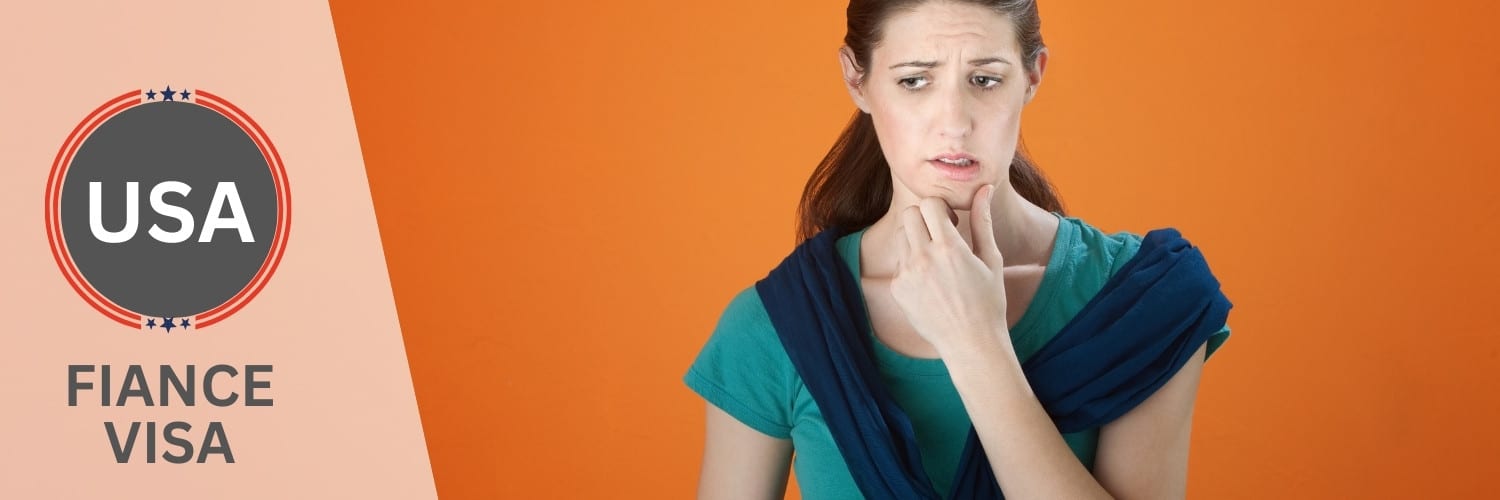
Applying for a Fiancé Visa (K-1 Visa) can be a complex process, and applicants often face several challenges along the way. Understanding these common issues and learning how to address them can significantly improve your chances of a successful application. This section highlights the typical challenges faced during the K-1 Visa process and provides practical solutions to overcome them.
Typical Issues Faced During the Application Process
1. Insufficient Proof of Relationship:
- Challenge: USCIS requires substantial evidence to prove that the relationship is genuine and not solely for immigration purposes. Insufficient or weak evidence can lead to delays or denials.
- Solution: Collect and organize robust evidence such as photos, travel itineraries, communication logs (emails, chat histories), affidavits from friends and family, and joint financial records. Present this evidence clearly and coherently to support the authenticity of your relationship.
2. Incomplete or Incorrect Documentation:
- Challenge: Missing, incomplete, or incorrect documents can cause significant delays and may result in the denial of the petition.
- Solution: Carefully review the USCIS requirements and guidelines for the K-1 Visa. Use a checklist to ensure all necessary forms and documents are included and accurately completed. Consider seeking professional assistance to review your application before submission.
3. Financial Requirements:
- Challenge: The U.S. citizen petitioner must meet specific income requirements to sponsor the foreign fiancé, demonstrating the ability to provide financial support.
- Solution: Provide comprehensive financial documentation such as recent tax returns, pay stubs, bank statements, and an Affidavit of Support (Form I-134). If the petitioner’s income does not meet the requirements, a joint sponsor may be needed.
4. Delays in Processing Times:
- Challenge: Processing times for K-1 Visas can be lengthy, causing stress and uncertainty for couples waiting to be reunited.
- Solution: Stay informed about current processing times by regularly checking the USCIS website. Submit a complete and accurate application to avoid unnecessary delays. Consider expedited processing requests if there are urgent circumstances.
5. Medical and Background Checks:
- Challenge: The foreign fiancé must pass a medical examination and provide police certificates from all countries where they have lived for more than six months since the age of 16.
- Solution: Schedule the medical examination with an authorized panel physician as soon as possible. Gather police certificates early in the process to ensure they are available when needed. Ensure all health and background documentation is complete and accurate.
Tips for Providing Strong Evidence of a Genuine Relationship
1. Photographs:
Include a variety of photos from different occasions, showing the couple together with friends and family. Caption the photos with dates and locations to provide context.
2. Communication Records:
Provide logs of emails, chat histories, and phone call records showing regular communication over time. Highlight key conversations that demonstrate the development of the relationship.
3. Travel Documents:
Include copies of airline tickets, hotel reservations, and travel itineraries that show visits to each other’s countries. Attach boarding passes and passport stamps as additional proof.
4. Financial Evidence:
Show joint financial accounts, shared bills, or remittances sent to each other. This demonstrates financial interdependence and a genuine commitment to the relationship.
5. Affidavits from Friends and Family:
Obtain sworn statements from friends and family members who can attest to the authenticity of the relationship. These affidavits should include detailed observations and specific examples of the couple’s relationship.
Addressing Financial Requirements and Affidavits of Support
1. Income Verification:
Provide recent tax returns, pay stubs, and employment verification letters to demonstrate the petitioner’s income. Ensure that the income meets or exceeds the 125% of the Federal Poverty Guidelines for the household size.
2. Joint Sponsor:
If the petitioner’s income is insufficient, a joint sponsor can be used. The joint sponsor must also provide an Affidavit of Support (Form I-134) and meet the same income requirements.
3. Assets:
In some cases, assets can be used to meet the financial requirements. Provide documentation of significant assets such as property, investments, or savings accounts.
By understanding these common challenges and taking proactive steps to address them, you can improve the likelihood of a successful K-1 Visa application.
Fiance Visa in the US
A Path to Greencard
#1 Contact us to get a free quote, or
#2 Schedule a Consultation now.
Post-Arrival Steps for Fiance Visa Holders
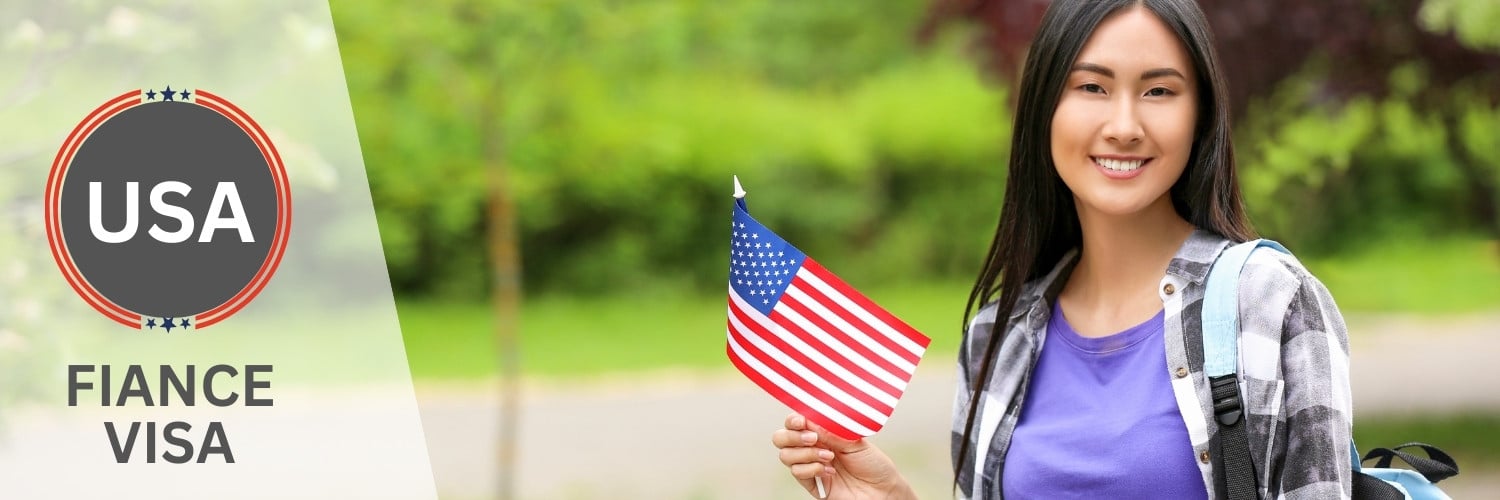
Once your foreign fiancé successfully arrives in the United States on a K-1 Visa, there are several important steps to take to ensure a smooth transition to permanent residency. This section outlines the critical actions to be taken within the first 90 days of arrival, including marriage, applying for Adjustment of Status (AOS), obtaining work authorization, and securing a Social Security number. Understanding these post-arrival steps is crucial for maintaining legal status and achieving long-term residency goals.
Marriage Within 90 Days of Arrival
1. Get Married:
Requirement: The K-1 Visa holder must marry the U.S. citizen petitioner within 90 days of entering the United States. This is a non-negotiable requirement; failure to marry within this period may result in the foreign fiancé having to leave the country.
Planning the Wedding: Ensure that all necessary arrangements and legal requirements for the marriage are met. This includes obtaining a marriage license from your local county clerk’s office and scheduling the ceremony.
Documentation: After the marriage, obtain multiple copies of the marriage certificate as it will be needed for various immigration and legal processes.
Applying for Adjustment of Status (AOS) to Become a Permanent Resident
2. Filing Form I-485 (Application to Register Permanent Residence or Adjust Status):
Complete Form I-485: The K-1 Visa holder must file Form I-485 to adjust their status from a non-immigrant to a lawful permanent resident (Green Card holder).
Supporting Documents: Include required documents such as the marriage certificate, Form I-864 (Affidavit of Support), medical examination results, and proof of the genuine relationship.
Filing Fee: Pay the appropriate filing fee, which includes the cost of the biometrics appointment.
Biometrics Appointment:
Scheduling: USCIS will schedule a biometrics appointment for fingerprinting and background checks. Attend the appointment as scheduled to avoid delays.
Purpose: Biometrics are used to verify the applicant’s identity and conduct necessary background checks.
Adjustment of Status Interview:
Preparation: USCIS may require an interview to confirm the authenticity of the marriage and the eligibility of the applicant. Prepare by reviewing your application and gathering all original documents.
Interview: Both spouses should attend the interview. The officer will ask questions about the relationship and the applicant’s background.
Receiving the Green Card:
Approval: If the AOS application is approved, the foreign spouse will receive a conditional Green Card (valid for two years). After two years, the couple must file Form I-751 (Petition to Remove Conditions on Residence) to obtain a permanent Green Card.
Obtaining Work Authorization
Employment Authorization Document (EAD):
Form I-765 (Application for Employment Authorization): The K-1 Visa holder can apply for a work permit by filing Form I-765 either concurrently with Form I-485 or after arriving in the U.S.
Benefits: The EAD allows the foreign fiancé to work legally in the United States while waiting for the
Adjustment of Status application to be processed.
Approval and Renewal:
Duration: The EAD is typically valid for one year and can be renewed if necessary. Once the Green Card is approved, the foreign spouse no longer needs the EAD to work legally.
Obtaining a Social Security Number (SSN)
Applying for a SSN:
Visit the Social Security Office: After arriving in the U.S. and getting married, visit the local Social Security office to apply for a Social Security number.
Required Documents: Bring the K-1 Visa, passport, marriage certificate, and proof of identity.
Benefits of a SSN:
Legal Employment: A Social Security number is required for legal employment in the U.S.
Financial Transactions: It is also needed for various financial transactions, such as opening bank accounts, applying for credit cards, and filing taxes.
Maintaining Legal Status
Compliance with Visa Terms:
90-Day Rule: Ensure that the marriage occurs within 90 days of the K-1 Visa holder’s arrival to maintain legal status.
Timely Applications: Submit the Adjustment of Status and other applications in a timely manner to avoid lapses in legal status.
Conditional Residence:
Form I-751: File Form I-751 to remove conditions on the Green Card before it expires. This application must be filed within 90 days before the expiration of the conditional Green Card.
By following these post-arrival steps, K-1 Visa holders can successfully transition to permanent residency and integrate smoothly into life in the United States.
Fiancé Visa in the US
Get Started Today
#1 Contact us to get a free quote, or
#2 Schedule a Consultation now.
Testimonials

Hearing from others who have successfully navigated the Fiancé Visa (K-1 Visa) process can provide reassurance and valuable insights for prospective clients. This section features real testimonials from our clients who have achieved their immigration goals with our help. These stories highlight our commitment to excellent service and the positive outcomes we strive to deliver.
Real Success Stories
Larry and Maria:
Larry, a U.S. citizen, and Maria, from Brazil, had been in a long-distance relationship for over two years. They decided to apply for a K-1 Visa to start their life together in the United States.
“We were overwhelmed by the paperwork and legal jargon, but Oliveira Lawyers made the process so much easier. They guided us every step of the way, and we were able to get Maria’s K-1 Visa approved in just a few months. We are now happily married and living in the U.S. Thank you so much for your support!”
Emily and Karl:
Emily, a U.S. citizen, met Karl during her travels in Germany. They decided to take their relationship to the next level by applying for a Fiancé Visa.
“The team at Oliveira Lawyers was incredible. They helped us compile all the necessary documents and prepared us thoroughly for the interview. Ahmed’s visa was approved without any issues, and we are now looking forward to our future together. Highly recommend their services!”
Samantha and Diego:
Samantha and Diego met online and quickly realized they were meant to be together. They wanted to expedite the process so they could start their lives together in the U.S.
“We were nervous about the whole process, especially because of the distance. Oliveira Lawyers provided exceptional service and constant support. They answered all our questions and ensured we were well-prepared for each step. Diego’s K-1 Visa was approved, and we couldn’t be happier!”
How Our Services Make a Difference
Our team of experienced immigration attorneys and consultants provides expert guidance throughout the entire K-1 Visa process. From the initial consultation to the final approval, we ensure that every detail
Our high success rate speaks for itself. We have helped countless couples successfully obtain their Fiancé Visas, allowing them to start their lives together in the United States.
Contact Us for Your Fiancé Visa Needs
If you are considering applying for a Fiancé Visa, let us help you make your dream a reality. Contact Oliveira Lawyers today to schedule a consultation and take the first step towards a successful K-1 Visa application.
Why Choose Our Services for Your Fiancé Visa Needs?
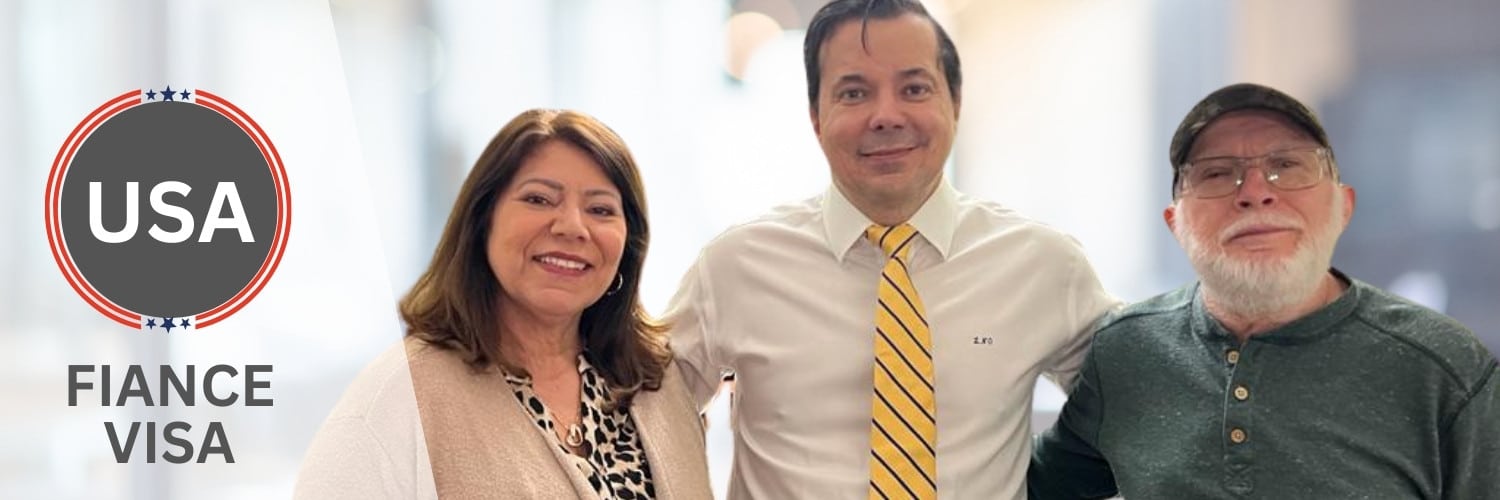
Selecting the right immigration service provider is crucial for a smooth and successful Fiancé Visa (K-1 Visa) application. At Oliveira Lawyers, we pride ourselves on offering exceptional expertise, personalized support, and a proven track record of success. Here’s why you should choose our services for your K-1 Visa journey:
Expertise in Fiancé Visa Applications
Specialized Knowledge:
Our team of experienced immigration attorneys and consultants specializes in Fiancé Visa applications. We stay updated on the latest immigration laws and policies to provide you with accurate and effective guidance.
Comprehensive Services:
We offer a full range of services, from initial consultation and eligibility assessment to document preparation, submission, and follow-up. Our comprehensive approach ensures that all aspects of your application are meticulously handled.
Personalized Support
We understand that every case is unique. Our personalized approach means we take the time to understand your specific situation, answer your questions, and provide tailored advice and solutions.
Dedicated Case Manager:
Each client is assigned a dedicated case manager who will guide you through the entire process, ensuring clear communication and consistent support. Your case manager will be your primary point of contact, providing updates and addressing any concerns.
Proven Track Record
High Success Rate:
Our success rate speaks for itself. We have helped countless couples successfully navigate the Fiancé Visa process and achieve their dream of living together in the United States.
Clear Pricing Structure:
We offer a transparent pricing structure with no hidden fees. Our goal is to provide high-quality services at competitive rates, ensuring you receive the best value for your investment.
Commitment to Your Success
We believe in proactive communication, keeping you informed at every stage of the application process. Regular updates and timely responses to your queries are part of our commitment to excellent service.
Post-Approval Support:
Our services don’t end with visa approval. We offer continued support to help you with the Adjustment of Status (AOS) process, ensuring a smooth transition to permanent residency.
Choosing Oliveira Lawyers for your Fiancé Visa needs means partnering with a team dedicated to your success. Contact us today to schedule a consultation and take the first step towards securing your future together in the United States. Your ideal immigration partner is just a click away.
Fiancé Visa in the US
Application by US Attorney
#1 Contact us to get a free quote, or
#2 Schedule a Consultation now.
Frequent Questions
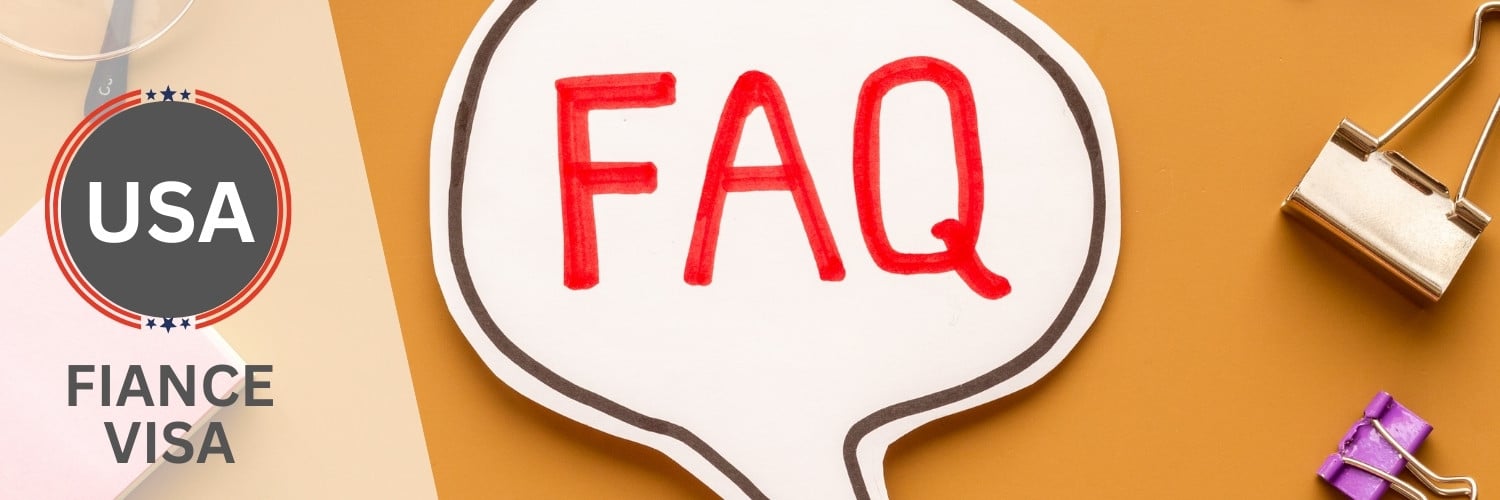
1. What is a Fiancé Visa (K-1 Visa) and how does it work?
The Fiancé Visa, officially known as the K-1 Visa, allows a foreign national engaged to a U.S. citizen to enter the United States with the intent of getting married within 90 days of their arrival. After the marriage, the foreign spouse can apply for Adjustment of Status to become a lawful permanent resident (Green Card holder). The K-1 Visa is specifically designed for U.S. citizens who want to bring their fiancé(e) to the U.S. to get married.
2. Why should I apply for a Fiancé Visa instead of a Visitor Visa if my foreign fiancé can’t qualify for a visitor visa?
A Visitor Visa (B-1/B-2) is for temporary stays and often requires proof of strong ties to the foreign country, which many foreign fiancées may not have if they intend to move to the U.S. A K-1 Fiancé Visa allows your partner to legally migrate to the U.S. for the purpose of marriage and eventual residency. Unlike the visitor visa, the K1 Visa is specifically intended for couples planning to get married and build a life together in the U.S.
3. What are the eligibility requirements for a Fiancé Visa?
To qualify for the K-1 Visa:
- The U.S. citizen petitioner must be legally free to marry.
- Both the U.S. citizen and the foreign fiancé must have met in person at least once in the past two years (unless certain cultural or hardship exceptions apply).
- The couple must have a bona fide intent to marry within 90 days of the fiancé’s arrival in the U.S.
Hiring an experienced immigration attorney ensures you meet all eligibility criteria and can help gather strong evidence to support your case.
4. How long does it take to get a Fiancé Visa approved?
On average, the Fiancé Visa processing time can take anywhere from 6 to 10 months. This includes the time it takes for USCIS to approve the petition (Form I-129F), as well as the time for the U.S. consulate to schedule and conduct the visa interview. Delays can occur if there are incomplete documents or legal complications. A good immigration attorney can help speed up the process by ensuring all forms are completed correctly and submitted promptly.
5. What documents are required for the Fiancé Visa application?
Key documents include:
- Form I-129F (Petition for Alien Fiancé)
- Proof of U.S. citizenship for the petitioner
- Evidence of in-person meetings (photos, travel records, etc.)
- Statements of intent to marry
- Proof of income and ability to financially support the foreign fiancé (Affidavit of Support)
An attorney can help you organize and submit the necessary documents while ensuring you avoid common mistakes that could lead to delays or denials.
6. What happens if the Fiancé Visa is denied?
If the K-1 Visa is denied, you will receive a notice explaining the reasons for the denial. Common reasons include lack of sufficient evidence of a bona fide relationship, incomplete documents, or failure to meet eligibility requirements. You can reapply or appeal the decision, but this process can be complex. Hiring an attorney early can help prevent denials by ensuring your application is strong and complete from the start.
7. How much does it cost to apply for a Fiancé Visa?
The total cost for a K-1 Fiancé Visa includes:
- USCIS filing fee for Form I-129F: $535
- DS-160 Visa Application Fee: $265
- Medical examination fees (vary by country)
Additionally, you should budget for potential travel costs, document preparation fees, and legal services. Working with an attorney may cost anywhere from $2,000 to $5,000, but it significantly increases the likelihood of a successful application.
8. Can my fiancé work in the U.S. after arriving on a K-1 Visa?
Yes, after arriving in the U.S. on a K-1 Visa, your fiancé can apply for work authorization (Employment Authorization Document, EAD) by submitting Form I-765. However, the work permit may take several months to process, and employment can only begin once the EAD is approved. An immigration lawyer can help expedite this process and ensure proper documentation is filed to prevent delays.
9. What are the most common mistakes when applying for a Fiancé Visa, and how can I avoid them?
Common mistakes include:
- Failing to provide sufficient evidence of the relationship
- Incomplete or incorrect forms
- Not meeting the income requirement for sponsorship
- Missing deadlines
These mistakes can result in delays or even denial of your K-1 Visa application. An attorney can help you avoid common pitfalls and ensure all forms and evidence are properly submitted.
10. Why should I hire an attorney to help with the Fiancé Visa process?
Hiring an attorney ensures that your Fiancé Visa application is filed correctly the first time. Immigration law is complex, and a small mistake can lead to delays, extra costs, or even denials. An experienced immigration attorney will:
- Help you gather the right evidence to prove the legitimacy of your relationship.
- Ensure all paperwork is accurate and complete.
- Guide you through the visa interview process.
- Prevent costly mistakes that could delay your application.
For most couples, investing in legal representation increases the chances of getting approved quickly and without stress.

